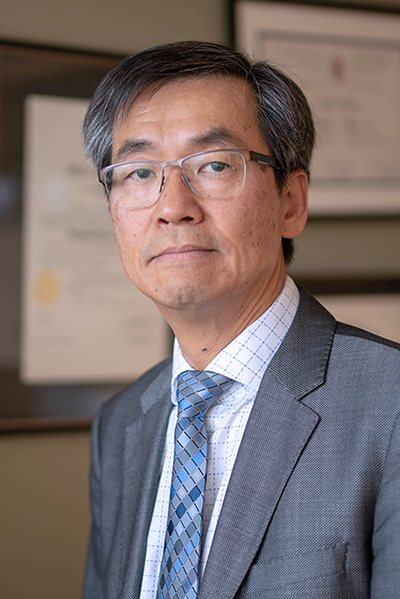How can genetics optimize drug therapy?

Dr. Richard Kim is the endowed Wolfe Medical Research Chair in Pharmacogenomics. He studies how genetic factors influence the response to various medications. He is daring to ask the question; how can genetics help optimize drug therapy?
By Max Martin, MMJC’19
Dr. Richard Kim wants to take precision medicine to the next level.In his role as the Wolfe Medical Research Chair in Pharmacogenomics, he’s studying how genetic information can better inform drug therapy.
“I think it’s the wave of the future,” explained Dr. Kim. “We have the potential to make patient care even more specific.”
Dr. Kim is focusing his work on how genomic information can inform individual diagnosis and treatment. “We want to understand how various molecular or genetic predictors can be used clinically to better inform drug dosing and selection, enhance drug safety and optimize drug benefit,” he said.
Current drug therapies often employ a trial-and-error approach, with patients monitored to see if the medication has the desired effect. This isn’t always the most effective, as there can be a lot of variation in how individuals respond to different medications due to a number of factors, such as genetic differences or metabolism.
Dr. Kim’s research program provides real-time, large-scale genomic information that is helpful in treating patients. These genomic technologies can be used to guide medicine selection and dosing, which could optimize things like pain management and mental health treatment.
A major focus of his research is on certain drugs that have been known to have severe toxicity in some patients – and his work has already had a profound impact on cancer treatment in London.
In his clinic, Dr. Kim is able to provide genomic testing for an enzyme called DPD to cancer patients. This enzyme is required to breakdown two common chemotherapy medications. For individuals who are deficient in DPD, taking these medications could be lethal.
Dr. Kim can screen for genetic markers to help identify people who might be at risk prior to treatment. During the past six years, he’s provided pre-chemotherapy testing and consolation to more than 1,800 patients.
“There is no question this is preventing life-threatening toxicity,” he said.
Another area of his research aims to assess the cost-effectiveness of genomic testing, as Dr. Kim says precision medicine helps reduce emergency room trips and hospital visits.
But he’s not stopping there, as he’s also working to develop innovative health care technology. He’s working toward building a medical record database that would allow for real-time sharing of information to better guide drug dosing and prescription.
“As a researcher, I’m always thinking of the next wave of innovation,” Dr. Kim said. “As we broaden and enhance our genomic testing and integrate that with a data approach, we can actually scale it up so it’s a more comprehensive approach.”
And it’s all work that Dr. Kim says wouldn’t be possible without a collaborative approach to research and the generosity of donors.
“Support from the endowed chair, as well as all of our donors and grant agencies, has enabled what we feel is large-scale translation research that will allow us to implement precision medicine into real-world hospital settings,” he said.
 Daring to Ask is a series that profiles Canada Research Chairs and Endowed Research Chairs at Schulich Medicine & Dentistry. These researchers are advancing knowledge in their respective fields, asking and answering questions that challenge that status quo and seeking to improve patient care. It is essential research made possible by generous donors and the investment of funding agencies.
Daring to Ask is a series that profiles Canada Research Chairs and Endowed Research Chairs at Schulich Medicine & Dentistry. These researchers are advancing knowledge in their respective fields, asking and answering questions that challenge that status quo and seeking to improve patient care. It is essential research made possible by generous donors and the investment of funding agencies.








